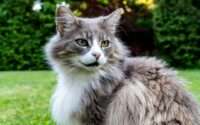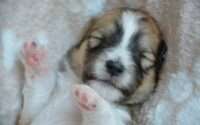Maine Coon Lifespan Unlocked: Expert Tips for a Healthy, Happy Cat!
Welcome to our comprehensive guide on Maine Coon lifespan! Maine Coon cats are renowned for their large size, friendly demeanor, and captivating personality. As one of the oldest and most beloved cat breeds, Maine Coons have captured the hearts of cat lovers worldwide. Understanding their lifespan is essential for providing the best possible care and ensuring a long, healthy life for these magnificent felines.
In this article, we’ll delve into the various factors that influence Maine Coon lifespan, from genetics and environmental factors to healthcare and lifestyle choices. Whether you’re a proud Maine Coon owner or considering adding one to your family, this guide will provide valuable insights and practical advice for promoting longevity and well-being in these remarkable cats.
The History of Maine Coon Cats
To truly appreciate the lifespan of Maine Coon cats, it’s essential to understand their rich history and heritage. Maine Coons are believed to have originated in the northeastern United States, particularly in the state of Maine, hence their name. While the exact origins of the breed remain shrouded in mystery, several fascinating legends surround their beginnings.
One popular legend suggests that Maine Coons are descendants of domestic cats brought to America by Viking explorers. According to this myth, these cats mated with local felines, resulting in the creation of the Maine Coon breed. While this story may be more fiction than fact, it speaks to the breed’s storied past and enduring popularity.
Maine Coons gained widespread recognition in the late 19th century when they were exhibited at cat shows across the United States. Their striking appearance, robust physique, and gentle temperament quickly endeared them to cat fanciers, earning them the nickname “gentle giants” of the cat world.
Today, Maine Coons are celebrated not only for their beauty but also for their intelligence, affectionate nature, and adaptability. Their fascinating history serves as a testament to their resilience and enduring appeal, making them cherished companions in households around the world.
Average Lifespan of Maine Coon Cats
Understanding the average lifespan of Maine Coon cats is crucial for prospective owners and current caregivers alike. While individual longevity can vary based on various factors, including genetics, environment, and overall health, Maine Coons are generally known for their relatively long lifespan compared to other cat breeds.
On average, Maine Coon cats live between 12 to 15 years, although some individuals may live well into their late teens or even early twenties with proper care. Factors such as genetics, diet, exercise, and healthcare play significant roles in determining a Maine Coon’s lifespan, highlighting the importance of proactive care and attention to their well-being.
Genetic Factors Affecting Lifespan
Genetics play a significant role in determining a Maine Coon cat’s lifespan and overall health. While Maine Coons are generally considered a robust and healthy breed, they may be predisposed to certain genetic health issues that can impact their longevity.
One common genetic health concern in Maine Coon cats is hypertrophic cardiomyopathy (HCM), a form of heart disease characterized by thickening of the heart muscle. HCM can lead to various cardiac issues, including heart failure, arrhythmias, and sudden death. Regular veterinary check-ups, including cardiac screenings, can help detect and manage HCM early, potentially extending a Maine Coon’s lifespan.
Additionally, Maine Coons may be prone to other genetic conditions such as hip dysplasia, polycystic kidney disease (PKD), and spinal muscular atrophy (SMA). Responsible breeding practices, including genetic testing and screening for hereditary health conditions, are essential for minimizing the risk of these issues and promoting the overall health and longevity of Maine Coon cats.
Environmental and Lifestyle Factors
Environmental and lifestyle factors play a significant role in determining the lifespan of Maine Coon cats. Providing a conducive environment and adopting healthy lifestyle practices are essential for promoting longevity and well-being in these beloved felines.
Maine Coon cats thrive in a stimulating and enriching environment that allows for plenty of mental and physical stimulation. Providing ample opportunities for play, exercise, and exploration can help keep Maine Coons mentally engaged and physically fit, reducing the risk of obesity and associated health issues.
In addition to physical activity, proper nutrition is vital for maintaining optimal health and extending a Maine Coon’s lifespan. Feeding a balanced diet that meets their nutritional needs, including high-quality protein, essential fatty acids, vitamins, and minerals, is essential for supporting overall health and vitality.
Moreover, minimizing stressors and providing a calm and secure environment can help reduce the risk of stress-related health problems and contribute to a longer, happier life for Maine Coon cats. Creating designated safe spaces, providing comfortable resting areas, and maintaining a consistent daily routine can help alleviate anxiety and promote relaxation.
Healthcare and Preventative Measures
Regular veterinary care and preventative healthcare measures are essential components of ensuring a long and healthy life for Maine Coon cats. Routine check-ups allow veterinarians to monitor a cat’s overall health, detect any potential issues early, and provide appropriate interventions or treatments as needed.
In addition to regular wellness exams, preventative measures such as vaccinations, parasite control, and dental care are essential for maintaining optimal health and reducing the risk of infectious diseases, parasitic infestations, and dental problems.
Maine Coon cats may be predisposed to certain health conditions, such as hypertrophic cardiomyopathy (HCM) and hip dysplasia, making regular screenings and monitoring crucial for early detection and management of these issues.
Additionally, spaying or neutering Maine Coon cats can have significant health benefits, including reducing the risk of certain cancers and reproductive-related health problems, which can contribute to a longer, healthier life.
By prioritizing preventative healthcare and proactive management of potential health issues, Maine Coon owners can help ensure their beloved feline companions enjoy a full and vibrant life for many years to come.
Tips for Extending Maine Coon Lifespan
Extending the lifespan of your Maine Coon cat involves incorporating various strategies and practices into their daily care routine. Here are some tips for promoting longevity and ensuring a happy, healthy life for your cherished feline companion:
- Provide a Balanced Diet: Offer a high-quality, balanced diet formulated specifically for Maine Coon cats’ nutritional needs. Choose food with real meat as the primary ingredient and avoid fillers and artificial additives.
- Encourage Regular Exercise: Engage your Maine Coon in daily play sessions and provide opportunities for climbing, scratching, and exploring. Exercise helps maintain a healthy weight, promotes muscle tone, and stimulates mental well-being.
- Maintain Regular Veterinary Check-ups: Schedule annual wellness exams with your veterinarian to monitor your cat’s overall health and address any emerging health concerns promptly. Early detection and treatment can help prevent serious health issues and extend your Maine Coon’s lifespan.
- Practice Good Dental Care: Dental health is crucial for overall well-being. Brush your Maine Coon’s teeth regularly, provide dental treats or toys for oral hygiene, and schedule professional dental cleanings as recommended by your veterinarian.
- Minimize Stress: Maine Coon cats are sensitive to their environment and can be easily stressed by changes in routine, loud noises, or conflicts with other pets. Create a calm and stable environment by providing predictable routines, designated resting areas, and ample opportunities for relaxation.
- Monitor Weight and Body Condition: Keep an eye on your Maine Coon’s weight and body condition to prevent obesity, which can lead to various health issues. Adjust their diet and exercise routine as needed to maintain a healthy weight.
By incorporating these tips into your Maine Coon’s care routine, you can help ensure they lead a long, happy, and fulfilling life.
Recognizing Signs of Aging
As Maine Coon cats age, they may experience changes in behavior, appearance, and overall health. Recognizing the signs of aging can help you provide appropriate care and support as your cat enters their senior years. Here are some common signs of aging in Maine Coon cats:
- Decreased Activity Levels: Older Maine Coons may become less active and spend more time resting or sleeping.
- Weight Changes: Senior cats may experience weight loss or gain due to changes in metabolism or underlying health conditions.
- Changes in Appetite: Loss of appetite or changes in eating habits can indicate underlying health issues and should be evaluated by a veterinarian.
- Dental Problems: Dental issues such as gum disease, tooth decay, or tooth loss are common in older cats and may affect their ability to eat comfortably.
- Arthritis and Mobility Issues: Aging Maine Coons may develop arthritis or other joint problems, leading to stiffness, lameness, or difficulty moving.
- Changes in Coat and Skin: Older cats may develop dry, flaky skin or a dull, unkempt coat due to decreased grooming or underlying health issues.
- Behavioral Changes: Senior Maine Coons may exhibit changes in behavior, such as increased vocalization, confusion, or irritability.
If you notice any of these signs in your Maine Coon cat, consult with your veterinarian for a thorough evaluation and appropriate management plan. With proper care and attention, you can help your senior Maine Coon enjoy a comfortable and fulfilling life in their golden years.
Stories and Testimonials from Maine Coon Owners
Hearing firsthand experiences and stories from Maine Coon owners can provide valuable insights into the joys and challenges of caring for these majestic cats. Here are some anecdotes and testimonials shared by Maine Coon enthusiasts:
- Martha’s Story: “My Maine Coon, Oliver, has been a beloved member of our family for over a decade. Despite his advancing age, he continues to amaze us with his playful spirit and gentle nature. With regular veterinary care and plenty of love, Oliver has defied the odds and remains a vibrant and cherished companion.”
- John’s Testimonial: “When we adopted our Maine Coon, Luna, we were captivated by her beauty and personality. Over the years, Luna has brought endless joy to our lives with her affectionate nature and quirky antics. While she may be considered a senior cat now, Luna’s spirit remains as lively as ever, reminding us of the timeless bond we share with our furry friends.”
- Emily’s Experience: “As a Maine Coon owner for over 15 years, I’ve witnessed firsthand the incredible resilience and longevity of these amazing cats. From playful kittens to dignified seniors, Maine Coons have a way of capturing your heart and enriching your life in ways you never imagined. Through proper care and unconditional love, my Maine Coons have been loyal companions through every stage of life.”
These stories and testimonials highlight the enduring bond between Maine Coon owners and their beloved feline companions, showcasing the remarkable qualities that make Maine Coons such cherished pets.
Conclusion
In conclusion, the lifespan of a Maine Coon cat is influenced by a combination of genetic, environmental, and lifestyle factors. By understanding these factors and implementing proactive care and preventative measures, Maine Coon owners can help ensure their cats lead long, healthy, and fulfilling lives.
From providing a balanced diet and regular veterinary care to creating a stimulating environment and recognizing signs of aging, every aspect of Maine Coon care plays a crucial role in promoting longevity and well-being. By prioritizing the health and happiness of their Maine Coon companions, owners can enjoy many years of companionship and cherished memories with these extraordinary felines.
As you embark on your journey with your Maine Coon cat, remember to cherish each moment and celebrate the unique bond you share. With love, patience, and dedication, you can provide your Maine Coon with the best possible care and create a lifetime of unforgettable experiences together.
Frequently Asked Questions
What is the average lifespan of a Maine Coon cat?
The average lifespan of a Maine Coon cat is typically between 12 to 15 years, although some individuals may live even longer with proper care.
What factors influence the lifespan of Maine Coon cats?
Various factors, including genetics, environment, diet, exercise, and healthcare, can influence the lifespan of Maine Coon cats.
Are Maine Coon cats prone to any specific health issues that may affect their lifespan?
While Maine Coon cats are generally considered a healthy breed, they may be predisposed to certain genetic health issues such as hypertrophic cardiomyopathy (HCM), hip dysplasia, and polycystic kidney disease (PKD).
How can I help extend the lifespan of my Maine Coon cat?
Providing a balanced diet, regular exercise, routine veterinary care, and a stress-free environment are essential for promoting longevity and well-being in Maine Coon cats.
Do Maine Coon cats require any special care as they age?
As Maine Coon cats age, they may benefit from adjustments in diet, exercise, and healthcare to address age-related changes such as decreased mobility, dental issues, and changes in appetite.
Can I predict how long my Maine Coon cat will live based on its lineage?
While genetics can play a role in determining a Maine Coon cat’s lifespan, it’s challenging to predict an individual cat’s lifespan based solely on its lineage. Proper care and attention are key factors in promoting longevity.
How often should I take my Maine Coon cat to the veterinarian for check-ups?
Maine Coon cats should receive annual wellness exams from a veterinarian to monitor their overall health and detect any potential issues early. Senior cats may benefit from more frequent check-ups.
Are there any specific dietary requirements for Maine Coon cats to promote longevity?
Maine Coon cats benefit from a high-quality, balanced diet formulated for their nutritional needs. Providing food rich in protein, essential fatty acids, vitamins, and minerals can support their overall health and longevity.
What signs should I look for to indicate that my Maine Coon cat is aging?
Signs of aging in Maine Coon cats may include decreased activity levels, changes in appetite, weight changes, dental issues, and behavioral changes such as increased vocalization or irritability.
How can I ensure a comfortable and fulfilling life for my senior Maine Coon cat?
Providing a comfortable environment, appropriate accommodations, regular veterinary care, and plenty of love and attention can help ensure a happy and fulfilling life for senior Maine Coon cats.





